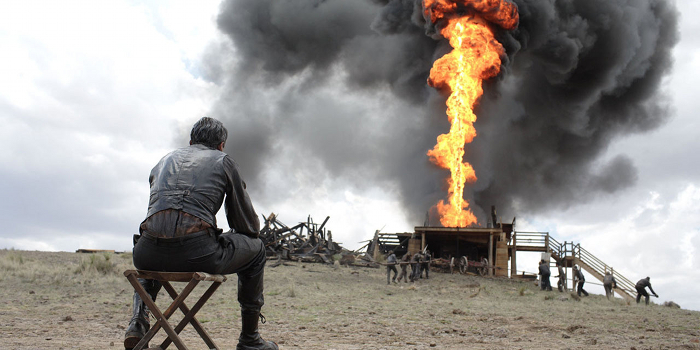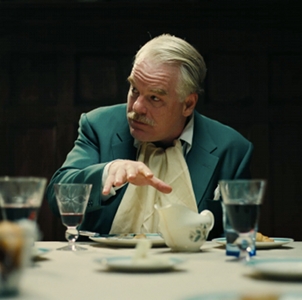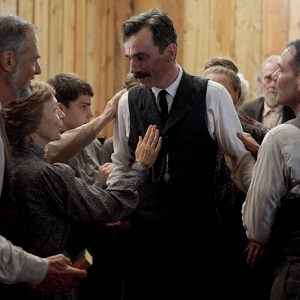
Note: This essay contains mild spoilers for each of Paul Thomas Anderson’s films. You’ve been warned.
One of the most unique and ambitious directors of the last thirty years, Paul Thomas Anderson has found a way to leave an auteurist thumbprint on each of his films, while also not overbearing each story with subversive personal commentary. His scripts have a timeless quality, rooted in characters that have the ability to perplex and yet sometimes endear audiences before pummeling expectations in what is always an explosive third act.
Prominently, the worlds of Paul Thomas Anderson are worlds of men and worlds of power. This is not to say that men are solely important or that women are subordinate, and in fact, Anderson as a writer is keen to strategically place women in significant, engaging positions, whether directly (a la Barry Egan’s sisters in Punch Drunk Love) or more indirectly (the engaging story of Maggie as a mother figure in Boogie Nights). But most assuredly, the camera is focused on the men, and specifically the power they gain and engage with during their ascendancy on screen.
One of the most unique and ambitious directors of the last thirty years, Paul Thomas Anderson has found a way to leave an auteurist thumbprint on each of his films, while also not overbearing each story with subversive personal commentary.
In many ways, these men are successful; Daniel Plainview buys land, acquires wealth, kills or otherwise destroys at will, and retires an alcoholic, as he would, in absolute seclusion; Lancaster Dodd, despite questions and hiccups, leads the faithful to a new residence in England; Frank Mackey continues telling all who will listen to “Respect the Cock”. But in other ways, Anderson’s men fall well short of acquiring whatever influence they long for. While Barry Egan tells off his sisters and chases his dream girl to Hawaii, he remains as powerless to his own antics as he is during the opening credits, save a brief run-in with a scheming Philip Seymour Hoffman. Dirk Diggler is kicked around, quite literally, before crawling back to his former employer with an apology in hand, tears streaming down his cheeks. He lives the high life for half of Boogie Nights’ runtime-he’s broke during the rest.
As with any narrative revolving around both the glamour and disadvantages of power and wealth, conflict is abundant. Even in the early reaches of his career, Anderson explored the power of information. In the director’s debut, Hard Eight, Sydney (an exhausted-looking Philip Baker Hall) is extorted by a wily Samuel L. Jackson over information about the old man’s past. There is no subtlety in this power play, in the dialogue or in Jackson’s performance; after a brief tango over what information is actually out there, the likely becomes the inevitable, and Sydney must do whatever he can to suppress any leaking information, ending the conflict with a pistol.

Information is a tool, and a convincing one, and this theme only becomes more fine-tuned throughout Anderson’s career. Fifteen years later in The Master, philosopher Lancaster Dodd (Philip Seymour Hoffman) is able to hold the attention of a room with relative ease; he has charisma and charm, sure, but he also has answers that so many are seeking. Through book signings, speaking engagements, and séances, Dodd is the champion of his movement, his power unquestionable within his own circles. But as absolutely as Anderson builds up Dodd’s position, he snatches it away in a second (albeit more subtly)-the minute a man questions Dodd’s methods at a séance one evening in New York and begins pressing Dodd on questions the master isn’t prepared for, the atmosphere in the room (and the invincibility of the leader) seem uncannily shallow.
At which point, another man looking for an avenue to explore his personal identity, Freddie Quell (Joaquin Phoenix), assaults the questioning journalist. Interestingly, Freddie does this of his own accord, but also for the same reason Dodd keeps Quell in his company: because Freddie is at Dodd’s mercy. This applies to his physical being (Freddie spends their first several weeks together on Dodd’s boat) as much as idealistically (needing stability and a new outlet for his energy, Freddie is fully engaged with Dodd’s “cause”). Their relationship remains familial, which Dodd uses to his advantage, rarely seeming as though he has to exert any real force to continue stringing Quell along. His power is strikingly paternalistic.
While perhaps viewed with a bit of a tongue-in-cheek attitude in his older films, Anderson’s use of power within the family has made for some harrowing and potent conflicts …
Having power in the construct of a family is a key character arrangement in which Anderson excels. Certainly in Punch-Drunk Love, Barry finds himself constrained by the expectations of his many sisters, an aura cleverly alluded to by the director without exerting any power of his own to explain the circumstances of their collective childhood. Without much prodding or exposition, the audience can feel Barry’s helplessness in the way he speaks to a phone sex worker (which eventually leads to a conflict based on intimidation). These same moralistic conflicts arise early in Boogie Nights, as Dirk Diggler sheds the constraints of his childhood surroundings, and particularly his mother, to find greater fame.
And many times in the director’s filmography, powerlessness is indeed tied to family. Of the many interwoven storylines in Magnolia, perhaps the one with the most emotional pull is that of Stanley Spector, a child brighter than most adults but who can’t outwit his own father to keep his own winnings. While his petition to his father during the film’s climax may have seemed like a turning point, power doesn’t often change hands so quickly in Anderson’s movies. Just look at the grown-up version of Stanley billed right next to young Jeremy Blackman; William H. Macy, or “Quiz Kid” Donnie, never quite gets back the power his parents stole from him (nor his winnings).

While perhaps viewed with a bit of a tongue-in-cheek attitude in his older films, Anderson’s use of power within the family has made for some harrowing and potent conflicts as well (even beyond Barry’s kicking of glass doors). Among the darkest is the return of Daniel Plainview’s son, HW, near the end of There Will Be Blood. In what should have been a proud moment for the paternal businessman, Daniel throws his deaf son out of the house for starting his own business, stating simply “This makes you my competitor.” HW makes an attempt at peace, hoping to at least keep a familial relationship, but is rebuffed. Ironically, in his anger and annoyance, Daniel takes this final conversation with his son to expose the truth about his origins-that the boy was an orphan, that he is “lower than a bastard,” and that, most maliciously, he has “none of me in you.” This conflict ends their relationship, their partnership, and also a bit of Daniel’s remaining sanity.
Although conflicts like these may be significant and essential plot points within Anderson’s films, they’re not often the most important driver of the plot itself. More prominent is the ascending or descending to or from power, with the inevitable conflict which arises along the way confirming or repudiating these new positions of power. In this sense, the chronology within each of his films has a lasting effect on the viewing experience, and helps define what makes Anderson such a monumental and important director in modern cinema, while also providing the depth and expansiveness which makes his films stand apart.
… several of his most distinguished works feature an extended portrait of imposing, ideologically strict men, such as Lancaster Dodd or Daniel Plainview.
Notably, several of his most distinguished works feature an extended portrait of imposing, ideologically strict men, such as Lancaster Dodd or Daniel Plainview. What makes the opening two acts so memorable is the ascent each man makes in their respective fields, one more ideological (or religious), and one far more industrial (in oil, of course). While we meet Dodd much further along in his journey to leadership (he already has a boat, for shit’s sake), the opening scene of There Will Be Blood commences at the bottom of a silver mine, with Daniel still over a decade from striking a lucrative deal with Union Oil. These decisions are hardly accidental, and serve to add to or obscure the real persona behind the man on his way to power. The long-form narrative in this instance provides insight into Daniel’s history of struggle, and his humble nature; to borrow a buzzword, he’s a rags-to-riches story. Lancaster Dodd is far more enigmatic, on the other hand, as we share virtually no time with the character before his introduction to Freddie Quell, our cinematic surrogate into the story chronologically. What we learn about Dodd is infrequent and not insignificant; at some point in his past, Dodd was probably incarcerated, married someone far younger than him (Amy Adams), and buried a box filled with manuscripts in the desert. Learning these details slowly and through the eyes of an outsider shows a master’s touch behind the camera and the script, compounding the complex nature of Dodd, and creating a character inexplicable to Quell and unpredictable to the audience.
The way in which Lancaster Dodd is framed is not unique to The Master; indeed, the ascension to power or the descent from it is rarely shown in its entirety. The most broad and complete journey in Anderson’s filmography is perhaps the story of Dirk Diggler in Boogie Nights, which concludes just before the porn star’s return to the adult film industry, which also coincides with the up-and-down career and fame of fictional director Jack Horner. The film begins years earlier, when a young and powerless Eddie Adams runs away from home to boost Jack’s career and start his ascent towards glittering parties, a house in the San Fernando Valley, and a Corvette Stingray.
However, this breadth in narrative is far from Anderson’s standard fare. A mere two years later, the director released his most stout film, Magnolia, which chronicles the lives of a myriad of interweaving personalities over what is in reality less than a day. In this uncommon instance, conflict takes center stage: characters who have abused their positions of power over their sons (Rick Spector), their devotees (Frank T.J. Mackey), their wives (Jimmy Gator), and even their employers (Donnie Smith) are all suddenly put on notice. While the story ultimately distinguishes itself through a clever series of entwined relationships, each character has a specific place within a power structure welded in place long before the plot begins. The series of conflicts that result are ultimately trumped by an act of a higher deity, overcoming any earthly power possible.
While Anderson stamps several of his films with the chronological brevity seen in Magnolia, he characteristically fleshes out a story which extends far beyond the beginning or end of the film. In this way, his hand as a director and his skill as a writer are linked; as elaborately and carefully crafted the films are visually on screen, the stories match quid pro quo, with often his more simple films having the most weight from a storytelling standpoint.
Two comparatively smaller films in scope, Hard Eight and Punch-Drunk Love, are small by comparison. The cast, focus, and aim of Anderson’s first and fourth features appear to be much simpler, but instead prove just how important the presumed events in the story are. Information and stories unseen on the screen are integral to understanding the characters at hand; to understand Sydney is to realize his past, and details are carefully withheld until just before the credits. In the similar way the audience sees the world of The Master through the eyes of Freddie Quell, John (John C. Reilly) is our vehicle through Hard Eight. Anderson’s script in Punch-Drunk Love is slightly more forthcoming, as we meet Barry at his work, at a family gathering, and even at home. However, there are many references of previous violent outbreaks (we see only one real instance during the film) and other important events, traumas, or relationships which are left unsaid. We don’t have a vehicle through which to view Barry’s life, and his mannerisms and awkwardness severely limit our understanding of the situation, which truly gives the film its rather complicated allure. While Anderson’s filmography currently totals 836 minutes (nearly two hours and twenty minutes per film), the extended versions documenting all this essential, presumed material could fill hours and hours more.
Even though this trend of deliberate withholding of character background is most noticeable in his two smaller films because of their emotional and personal isolation, the brilliance of a film such as Magnolia is how developed the characters are despite being dropped into one evening of their lives. The stories of Donnie Smith, Jimmy Gator, or Stanley Spector could easily have been given the extended treatment a la Boogie Nights. However, each of these films would have been far narrower in scope and much less refreshing. In merely presenting these individual stories without overexposing or judging, Anderson can explore characters as large as Frank T.J. Mackey or as small as Reed Rothchild while still not giving a value to their decisions or actions. Mackey in particular is compelling as a simple, egocentric and boastful character who is revealed to have been fully shaped by his past-a past divulged by a journalist who has obviously done her homework in a role which is possibly the most powerful for a female in any of Anderson’s films.
In the same way, characters on the periphery of those more central to the storyline in Boogie Nights continually engage our attention over the years the film portrays. Buck Swope and Jessie St. Vincent (Don Cheadle and Melora Walters) delve into a traditionally “proper” lifestyle following their careers in pornography, and their eventual pursuits of raising children and opening a business are chronicled rather obliquely. In this instance, their purpose never ends in directly interacting with the lead characters. In Anderson’s follow-up, Magnolia, John C. Reilly’s cop Jim Kurring threads together two separate storylines, and is a working cog in the framework of a movie about the interrelated nature of people living entirely different lives. Here Kurring’s story is really only essential by way of tying together two plots, but Anderson still crafts an interesting, sympathetic minor role. In neither case does the role of the tangential character emasculate their agency, a fact which puts them in crowded company within Anderson’s filmography; while many of Anderson’s characters are indeed powerless, even more ascend to their personal apex within his films. Buck Swope, who spends the opening two hours being beat out for roles and in his pursuit of women, eventually opens his electronics store thanks to a violent stroke of luck. Magnolia’s Jim Kurring, more in command of his situation, stays true to his guns (once it falls from the sky) and gets the girl he’s in love with-although this could again be the product of luck, as Claudia (Melora Walters) has just reconnected with her mother after years of suppressed anger.
Ending “on top of the world” is not unique to the men of Paul Thomas Anderson: without fail, they get the girl (Hard Eight, Punch-Drunk Love), get some girl (The Master), a second chance at their career (Boogie Nights), or the final word (There Will Be Blood). And that’s because they run the show. The industry booms until Dirk Diggler leaves. Frank Mackey gets to see his father die. Lancaster Dodd decides who can ask the questions about his movement. And the chase doesn’t end until Daniel Plainview sits on the bowling alley in his mansion with a bowling pin of death in his hand and wheezes triumphantly: “I’m finished.”




